|
|
|
Sort Order |
|
|
|
Items / Page
|
|
|
|
|
|
|
| Srl | Item |
| 1 |
ID:
156562
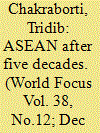

|
|
|
|
|
| Summary/Abstract |
The issue of regional cooperation and establishment of a regional organization had been an important attribute of Southeast Asia since early 1960s. After years of conflict and turmoil, the natural craving for peace provided the immediate impetus for regional cooperation which was ultimately formalized with the establishment of the Association of Southeast Asian Nations (ASEAN) on 8 August 1967 in Bangkok with the five original member countries namely Indonesia, Malaysia, Singapore, Thailand and the Philippines.
|
|
|
|
|
|
|
|
|
|
|
|
|
|
|
|
| 2 |
ID:
162979
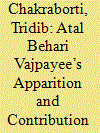

|
|
|
|
|
| Summary/Abstract |
After India became independence in 1947, Jawaharlal Nehru remained the prime architecture who framed the foreign policy of India. However, after the demise of Nehru, the reins of the country went to the hands of different political leaders starting from Lal Bahadur Shastri (1965) to P.V. Narasimha Rao (1995) and finally the cudgel went to the hands of Atal Bihari Vajpayee in 1998. When Atal Bihari Vajpayee came to power, he was faced severe challenges both internally and externally and from the very inception to the office as a Prime Minister, Vajpayee was engrossed with a manifold task.
|
|
|
|
|
|
|
|
|
|
|
|
|
|
|
|
| 3 |
ID:
140609
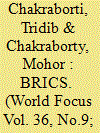

|
|
|
|
|
| Summary/Abstract |
The genesis of BRIC (Brazil-Russia-India-China, predecessor of present-day BRICS) as a multilateral grouping of the four developing or emerging economies can be traced back to September 2006, with the 61st Session of the United Nations General Assembly in New York, in a bid to explore measures of economic and political cooperation among the member-States. Officially, the organization came into existence in 2009, and with the inclusion of South Africa as the fifth member in April 2011, BRIC was re-christened BRICS. Till date, the BRICS member-states have held seven Summits and the latest in Ufa, Russia (July 2015) has been a watershed with the entry into force of the New Development Bank/BRICS Bank and the Contingent Reserves Arrangement. The BRICS Bank is heralded as an alternative to the World Bank-International Monetary Fund-led international economic architecture. However, it remains to be testified whether the BRICS Bank can evolve as a pulsating alternative to the WB-IMF-led financial system, though there is no way denying its establishment as a stepping stone for providing a predominantly South-South economic cooperative mechanism.
|
|
|
|
|
|
|
|
|
|
|
|
|
|
|
|
| 4 |
ID:
097278


|
|
|
| 5 |
ID:
116568
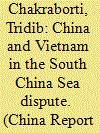

|
|
|
|
|
| Publication |
2012.
|
| Summary/Abstract |
The South China Sea dispute which has spilled over from the twentieth to the twenty-first century, is yet to find an amicable solution. The root cause of this tension is the dispute among the various claimants as regards the procurement of energy resources and securing territorial legitimacy. The entry of the US into the picture has further complicated the problem. In order to evolve a congenial regional environment, the disputing countries must evolve a collaborative outlook, not confrontationist, and adopt a regional perspective rather than proceed from their national interest only and take recourse to multilateral mechanisms as a means to reduce tension in the region. If the prognosis that the '21st century is the century of Asia' is to be made a reality, then the economic prosperity and development of the Asian region will be essential, for which, all the disputing countries should change their mindset from local to global level and keep the South China Sea region as less tension-prone as possible.
|
|
|
|
|
|
|
|
|
|
|
|
|
|
|
|
| 6 |
ID:
123406
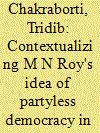

|
|
|
|
|
| Publication |
2013.
|
| Summary/Abstract |
Narendra Nath Bhattacharya (1887) and in later years known as Manabendra Nath Roy (M.N. Roy) adorns a remarkable place in the history of Indian philosophy of the twentieth century. He was a versatile scholar, a linguist, a born revolutionary, a subtle theorist, a penetrating intellectual, an uncompromising rationalist and an original thinker. Unlike the other Indian political thinkers of India, Roy has made a clear distinction between philosophy and religion in his thought. Roy's intellectual odyssey took him from militant Hindu nationalism to communism and there from to emerging as a humanist and radical democrat.
|
|
|
|
|
|
|
|
|
|
|
|
|
|
|
|
| 7 |
ID:
189612
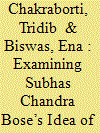

|
|
|
|
|
| Summary/Abstract |
Subhas Chandra Bose remains a leading personality who has symbolized himself as a leading freedom fighter, a true guide, and a devoted friend of the Indian masses and the world. As one of the chief architects of the Indian freedom movement, he awakened the country’s masses from the slavish siesta of self-degradation and stimulated their sense of its cultural, historical, and national glory. Throughout his political career, India’s liberation from British rule remained Subhas Chandra Bose’s foremost political goal, and his idea of nationalism is not only a political movement but an ethical one as well. This article will highlight the major rationale behind Subhas Chandra Bose’s contribution to promulgating the ideas of nationalism in the minds of the Indian masses.
|
|
|
|
|
|
|
|
|
|
|
|
|
|
|
|
| 8 |
ID:
186504
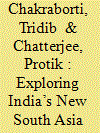

|
|
|
|
|
| Summary/Abstract |
Having discussed the current trends of Modi’s foreign policy it is clear that P.M. Modi may not be comfortable with Pakistan on account of his first tenure experience and thus his shift towards
the other neighbouring countries of BIMSTEC members through his ‘Act East’ and Neighbourhood First policy. The decision of the Indian government to invite members of BIMSTEC to the Prime Minister’s oath-taking ceremony turned out to be a great initiative. This was a realistic plan on the part of the Modi government to encourage South Asian participation in regional cooperation with all countries of BIMSTEC.
|
|
|
|
|
|
|
|
|
|
|
|
|
|
|
|
| 9 |
ID:
130791
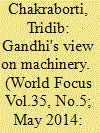

|
|
|
|
|
| Publication |
2014.
|
| Summary/Abstract |
Mahatma Gandhi held a distinctive place in the history of Indian freedom movement as well as in the
momentous evolution from tradition to modernity. During the time-period ranging from l9l6 to 1947,
Gandhi had revealed his luminous dexterity and methods which made him the vanguard of the nation,
by the relentless logic of history. He was an iconoclast. Who quivered the basics of the powerful British Empire in India through multiple novel means such as non- violent, satyagraha, . Fasting, hartals, non'-cooperation and mass civil disobedience. Gandhi was a multifaceted virtuoso who applied his mind to glitches of human distress. His social ideas amply exhibited a deep and abiding consciousness of the fundamental reformation of the Indian society. In the economic sphere, he ardently believed that the economic salvation of India exclusively depended on the economic regeneration of vast millions of Indians living in the rural areas. ln line with such a policy. he championed the promotion of small scale village and cottage industries, which could offer productive employment on a long-term basis to the common masses of India. At the political level, Gandhi felt that the state was a means of intimidation, since it was likely to demoralize the cherished essential freedom of individuals. As an individualist, Gandhi judged that individuals could enhance their traits through truth and non-violence, drenched with an ambience of freedom.
|
|
|
|
|
|
|
|
|
|
|
|
|
|
|
|
| 10 |
ID:
133888
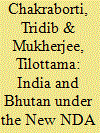

|
|
|
|
|
| Summary/Abstract |
India has always shared a convivial relation with Bhutan. This article traces the historical background of the bilateral relations, attempting to investigate why Bhutan, despite being tiny in size, is so important even after the change of Government in India. Pragmatically, the new Prime Minister of India, Narendra Modi, stated his foreign policy by selecting Bhutan as his first trip abroad. What are the promises that Modi has made to Bhutan? Who all have raised objections to Modi's plans for Bhutan and why? How important is the China factor in developing the India-Bhutan relations?
|
|
|
|
|
|
|
|
|
|
|
|
|
|
|
|
| 11 |
ID:
133896
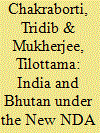

|
|
|
|
|
| Publication |
2014.
|
| Summary/Abstract |
India has always shared a convivial relation with Bhutan. This article traces the historical background of the bilateral relations, attempting to investigate why Bhutan, despite being tiny in size, is so important even after the change of Government in India. Pragmatically, the new Prime Minister of India, Narendra Modi, stated his foreign policy by selecting Bhutan as his first trip abroad. What are the promises that Modi has made to Bhutan? Who all have raised objections to Modi's plans for Bhutan and why? How important is the China factor in developing the India-Bhutan relations?
|
|
|
|
|
|
|
|
|
|
|
|
|
|
|
|
| 12 |
ID:
089160
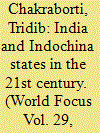

|
|
|
| 13 |
ID:
116081
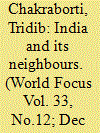

|
|
|
| 14 |
ID:
104610
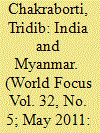

|
|
|
| 15 |
ID:
109746
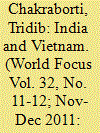

|
|
|
| 16 |
ID:
193407
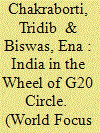

|
|
|
| 17 |
ID:
169802


|
|
|
|
|
| Summary/Abstract |
“My visit to Vietnam is to nurture a relationship between our two societies and nations. The linkages between our two countries have deep historical and civilizational roots, going back over two thousand years. These cultural bonds reflect themselves in many ways, most prominently, the connection between Buddhism and the monuments of the Hindu Cham civilization. In recent decades, our shared and strong desire for the progress and prosperity of our peoples has shaped our ties. In India, we believe in sharing our knowledge, experiences and expertise with other developing countries. There can be no better example of this than in the success of our multifaceted bilateral cooperation with Vietnam over the last four decades,” this was the speech delivered by Indian Prime Minister Narendra Modi during his visit to Vietnam on 3 September, 2016. In the same speech, he further said: “As two partners, we must also take advantage of our synergies to jointly face emerging regional challenges, and to exploit new opportunities.
|
|
|
|
|
|
|
|
|
|
|
|
|
|
|
|
| 18 |
ID:
110323
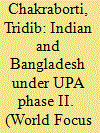

|
|
|
| 19 |
ID:
179577
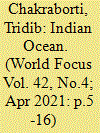

|
|
|
|
|
| Summary/Abstract |
In the chronicles of world history, the Indian Ocean always remains a core subject matter of historic-strategic discourse. As a geographic expanse, Indian Ocean is the world’s third largest ocean and stands astride Asia in the north, Antarctica in the south, Africa in the west and Indochina in the east. It has four most critical choke points (access waterways) - the Suez Canal, Bab-el Mandeb, the Strait of Hormuz and the Strait of Malacca which connects the Middle East, Africa and East Asia with Europe and the Americas. Within these waterways, it has 48 independent island and littoral countries; 18 in Africa, 11 in the Middle East, 7 in South Asia, 6 in Southeast Asia, 5 island states and Australia, while France and the United Kingdom still have island territories in the ocean.
|
|
|
|
|
|
|
|
|
|
|
|
|
|
|
|
| 20 |
ID:
093326
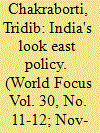

|
|
|
|
|
|
|
|